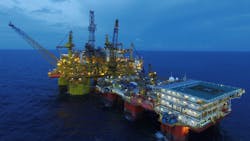Royal Dutch Shell Plc and Eni SpA senior executives will face trial over a $1.1 billion bribery scandal in Nigeria, an Italian judge ruled on Dec. 20.
The trial will start on March 5 in Milan, judge Giusy Barbara said. The long-awaited decision, initially expected several months ago, will not only affect the two companies but 11 individuals including Eni CEO Claudio Descalzi.
The case is related to the acquisition of a deepwater oil-prospecting license by Eni and Shell in the Gulf of Guinea in 2011. Prosecutors allege that the two companies’ payment of almost $1.1 billion into a Nigerian government escrow account was later distributed as payoffs.
While energy producers have come under scrutiny for bribery and corruption in the past, a trial centered around the sitting CEO of an oil major is rare.
“This is really quite a big precedent-setting case,” said Barnaby Pace, a campaigner at watchdog Global Witness, which first shone a light on the alleged transactions. “It’s unusual to see oil majors at the sharp end of the stick in this way,” Pace said before the decision was announced.
Full Confidence
Shell said that it’s “disappointed” by the judge’s decision. “We believe the trial judges will conclude that there is no case against Shell or its former employees,” said Anna Haslam, a London-based spokeswoman. The Anglo-Dutch company, whose former upstream director Malcolm Brinded is among those facing trial, acknowledged in April that it was aware of the destination of part of the payments, but denied wrongdoing.
Eni’s board released a statement expressing “full confidence in the correctness and integrity of both the company’s and chief executive’s actions,” and said it’s confident of Eni’s “non-involvement in the alleged illegal conducts.”
Brinded said on Dec. 20 he’s “disappointed” by the decision and insisted “there is absolutely no basis for the charges against me.”
A final court ruling may take years, potentially bringing steep legal costs for the two companies. The average length of a civil trial in Italy was 460 days in 2016, according to the Ministry of Justice.
Shell and Eni are also facing criminal charges in Nigeria over the same deal. In Europe, Dutch investigators visited Shell’s offices in The Hague in 2016 as part of a probe into the same matter.
By Chiara Albanese, Sergio Di Pasquale and Kelly Gilblom
About the Author
Bloomberg
Licensed content from Bloomberg, copyright 2016.
